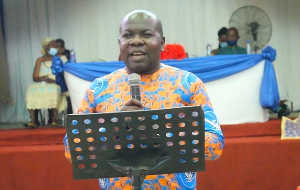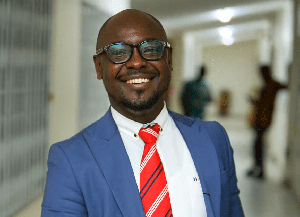The Roadmap to Recovery report for Ghana Airways, which was conducted by Brian Davies in late 2003, but was boycotted by the Roads and Transport Ministry and the Ghanair Board, has revealed that the financial fortunes of the airline have deteriorated rapidly after the 2002 Price Water House (PWC) audit with losses averaging about $1.5m a month.
Ghana Airways, the report said, has lost money every year over the last 10 years, apart from 1997 and 1998.
Similarly, it has been revealed that the airline spent a whopping $13.5 million dollars, which is equivalent to ?121.5 billion, to purchase a DC10 from Malaysia, but used the aircraft for only 3,745 hours because of disputes over final payments which eventually led to the confiscation of the aircraft by other creditors of the airline.
According to the report, the airline has been insolvent since 1999 but has continued operations in contravention of the Companies Code of Ghana. An insolvent company, according to experts, is a company which cannot pay its debt as they fall due in the usual course of business or a company whose liabilities are in excess of a reasonable market value of assets held.
?Ultimately, it will be lack of cash that will ground the airline, but surprisingly, there is no forecast of cash flow available to the board or senior management to assist in planning how payments are to be covered in the coming months,? the report said.
The boycotted report indicates that the board and management of Ghana Airways are aware of the rapidly deteriorating financial condition of the airline because of the daily calls from creditors threatening to ground the airline and consequent pleas for cash to cover the most urgent payments.
The report further warned that the directors of the Ghana Airways could be held personally liable if by continuing to trade, while insolvent, the position of the creditors is worsened, adding that the Government of Ghana (GoG) had urged the airline to continue trading so that it could be held liable for any liabilities created after identifying that the company is insolvent.
According to the report, the only reason for the continued operation of Ghana Airways is for the airline to improve the prospects of creditors being paid, and ?therefore management should not be doing anything that makes the debt situation worse.?
The Brian Davies report observed that late last year, when the investigations were underway, plans were at an advanced stage to dry lease two DC 10 aircraft for a period of six months, even though there were credible indications that the airline could lose close to $9 million.
?At a fairly late stage in the process, the Finance Department had produced a business plan for this period that showed the company would lose approximately $9 million if the leases went ahead, before taking royalties into account. There was no indication how these increases were going to be funded. The rationale for this action was simply that it would cost less than wet leasing,? Brian Davies noted.
The report also noted that there were no up-to-date financial statements that include balance sheets or cash flow information, a situation, it said, makes it impossible to provide an accurate assessment of the current financial condition of the airline.
According to the report, the only financial information, which came from the Finance Department, was an un-audited financial performance up to the end of the year 2002 and a management report showing financial performance for the first six months of 2003. The report lamented that even information on payables and receivables up to August 2003 was limited.
On the aspect of the airline?s financial performance, the report noted that it was difficult to properly assess the financial performance of the airline at the operating level owing to lack of audited accounts and massive distortions caused by trading while insolvent.
HOW TO LOSE MONEY
Brian Davies, the man credited in aviation circles as the one who turned Kenyan Airways from a useless and highly indebted airline to a profit making one, said that the true impact of defective decision-making is also buried under the formal accounting conventions, adding that the best illustration is the purchase of one of the DC10 aircraft According to his report, Ghana Airways purchased a DC10 9G-ANC from Malaysian Airline System (MAS) in May 2000 for a reported sum of $13.5 million, but there appeared to have been a dispute over the final payment of the aircraft so MAS kept part of the aircraft records as a lien on outstanding payments.
?This meant that, the aircraft was grounded in November 2001 because the ?C? check could not be carried without the records.
The aircraft was finally ferried to Alitalia in January 2003, only to be impounded by Alitalia for non-payment of maintenance support fees,? it said.
Brian Davies observed that, it is almost certain that the aircraft will never fly again because the outstanding amounts are now greater than the market value of the aircraft. The report also revealed that since the aircraft was purchased in May 2000, it has flown a total of 3,754 hours, the equivalent of only one year?s revenue service.
?Although the acquisition cost of this aircraft will be amortised over 10 years (in accordance with normal accounting rules) the real cost has been an additional $13.5 million to fly only 3,754 hours. This amounts to an additional ownership cost of $3,596 per hour,? the report revealed.
This situation, according to the report, has ?more than doubled the effective cost of operating this aircraft.?
Continuing with the appalling revelations, the Brian Davies report noted the above story can be repeated at varying degrees in Ghanair purchases and leases of almost every aircraft in Ghana Airways? fleet, adding that the entire fleet is prematurely out of service for non-payment of bills or lack of funds to carry out essential maintenance.
The report observed that, in order to maintain operations, the airline had begun wet leasing wide-body aircraft and dry leasing two replacement DC-9 aircraft, leaving in-house resources idle and further increasing the effective cost of operations.












